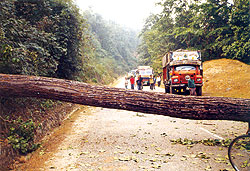 The bus journey to Ghorahi in Dang district took much longer than usual. Over a dozen checkposts had sprung up along the highway west of Narayanghat. In addition, mobile paramilitary checkpoints also sprang out of nowhere. Most of the checking is routine. Security officials step into the vehicle and check your belongings. But there are also those that require you to step out and line up for a body search.
The bus journey to Ghorahi in Dang district took much longer than usual. Over a dozen checkposts had sprung up along the highway west of Narayanghat. In addition, mobile paramilitary checkpoints also sprang out of nowhere. Most of the checking is routine. Security officials step into the vehicle and check your belongings. But there are also those that require you to step out and line up for a body search. It feels like you're entering a war zone as you reach Bhalubang, the point where you officially enter the mid-west. You get a thorough frisking: bags are opened, diaries are read and telephone books scanned. You are asked where you are headed and why. The person sitting next to you in the bus may not want to have a casual conversation. There is apprehension in the air.
When I reached Ghorahi on 7 December, this usually busy highway junction looked like a ghost town. It was undergoing its 13th night of dusk-to-dawn curfew that began even before the state of emergency was declared on 26 November. (Elsewhere in the region, an unofficial curfew is in place after sundown, as nobody ventures outdoors in any case.)
Ghorahi is the site of the 23 November rebel attack which effectively ended the four-month-old government-Maoist ceasefire. Several government offices were plundered and weapons looted from the military barracks. But signs of the conflict can be seen even before you reach Ghorahi. The roadside is lined by stumps of trees felled by the rebels as roadblocks.
Every now and then the dusty stillness is shattered by the heavy roar of rotors as helicopters ferry supplies and troops to the frontlines in Salyan and Rolpa districts. Schools are slowly opening their doors but bewilderment is writ in the faces of students-a suppressed fear that echoes, like the sound of gunfire you can hear almost every night. The unseen scars are deeper still.
"We're becoming used to sleeping with sounds of gunfire all around," says a local school teacher. "There has been fighting every night since the Maoist attack." On the night of 9 December, the army and Maoists clashed at Ratmate, Rolpa. Down here in Ghorahi, the night rang with blank gunfire from the army unit nearby.
Life in the Dang Valley is nowhere near normal. The 42-km road to Holeri in Rolpa district has been closed. Elsewhere, buses ply half-empty. With business down, wayside storekeepers laze in the sun. Locals even hesitate to talk to strangers, let alone discuss the insurgency and the ongoing counter-insurgency. Lodge-owners are scared to let out their rooms unless they are sure of their guests' bonafides and in any case only do so after having informed the police. This reporter was the only guest for three nights in a lodge with more than 60 beds.
Students from the local college hostel have been asked to vacate their lodgings. The Nepal Bank Limited, which was looted by the Maoists, has not opened for business. However, the Agricultural Development Bank, also hit, is being given a face-lift. A weekly paper close to the Maoists, Jana Ubhar, has stopped publishing and the editor is underground.
The Chief District Officer and the Dputy Superintendent of the Police, who had been abducted in the course of the 23 November attack and later released, had been given a transfer. Their replacements were yet to arrive. The chief of the Land Revenue Office had left the district to inform his superiors about the damage caused by the Maoist attack on his office.
In the absence of senior officials, no one in the civilian administration in Ghorahi was ready to provide information on the security situation - such as the army's gunning down of 11 unarmed Tharu farm labourers. I later learnt that although all of them may not have been Maoist fighters, they certainly were Maoist sympathisers, for the simple reason that the Maoists had enforced a new share-cropping scheme, Tri-Khandi, under which the tillers received two-thirds of the harvest.
The feeling of uncertainty has infected everyone, including politicians. Amar Giri, a member of the CPN (UML)'s Rapti zonal committee, had attended an all-party meeting at the district administration office. "Every time we asked them about arrangements during the curfew, the civilian authorities tell us \'we'll ask the army'," he said.
Bam Bahadur DC, president of the local Nepal Trade Union Congress, seemed as confused: "We just don't know what will happen next. There's a war going on here."
A security official in Ghorahi probably summed up the post-23 November situation best: "The Maoists have not been able to rest so far, but they have been able to keep the state on its toes."


